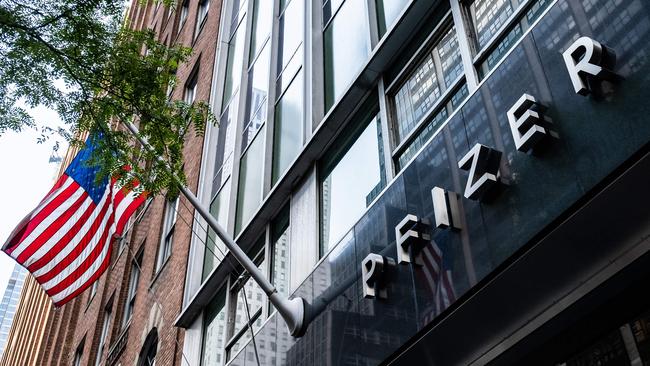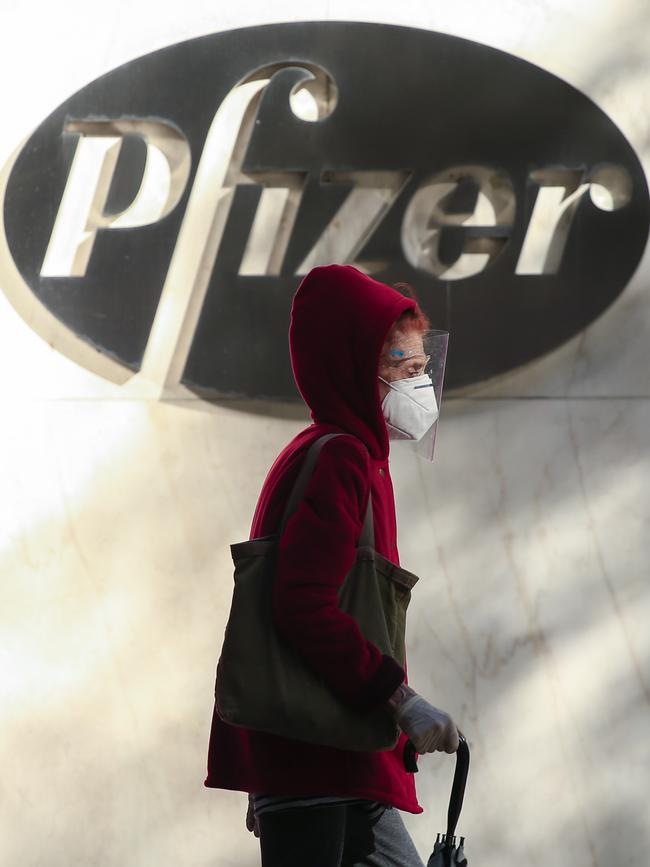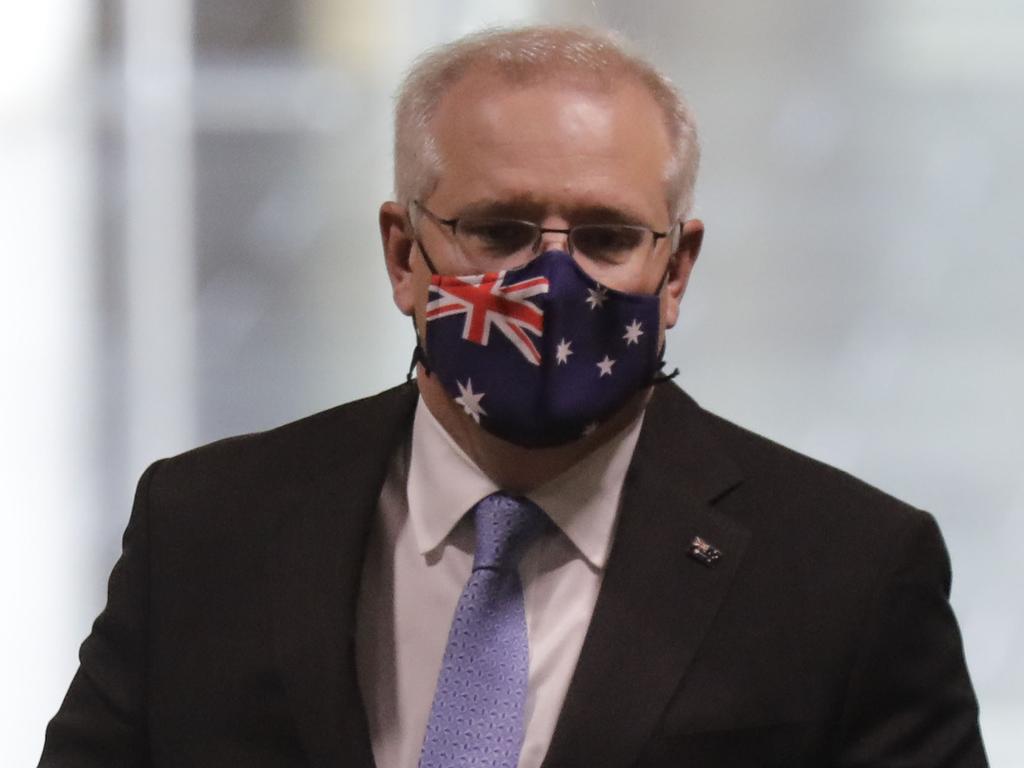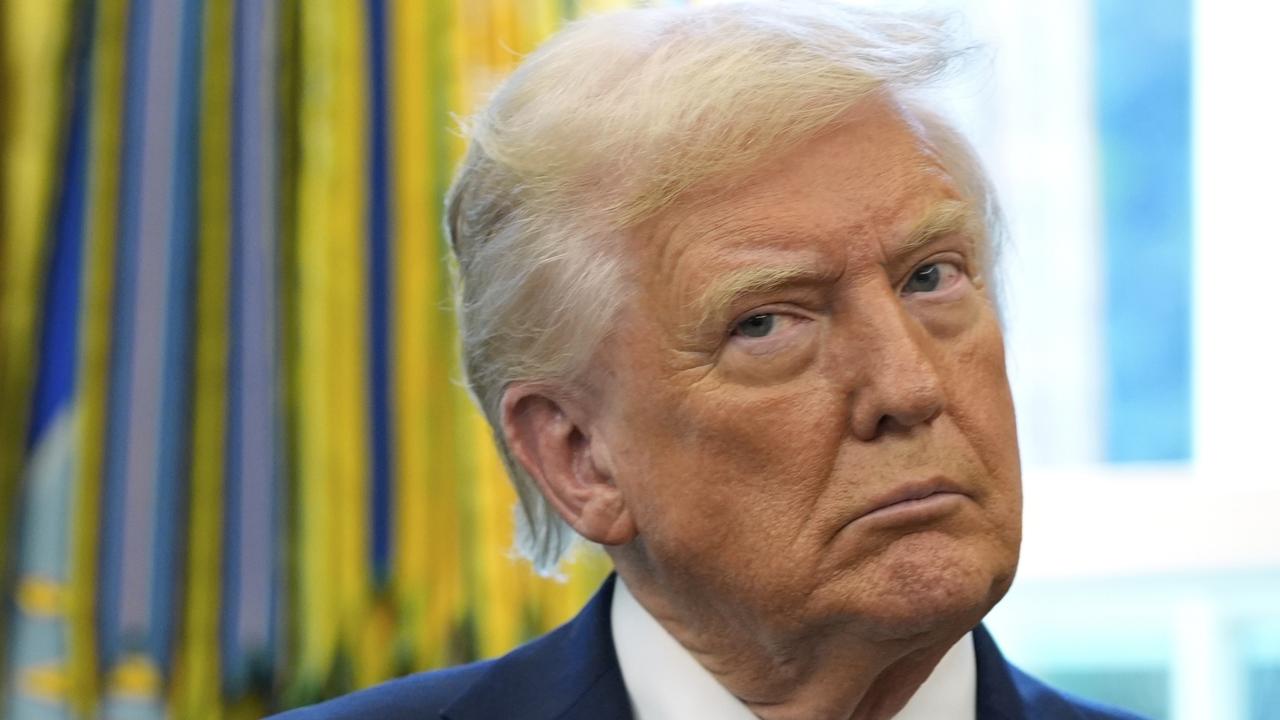Pfizer coronavirus vaccine ‘90 per cent effective’
Pfizer says COVID-19 vaccine results have wildly exceeded initial expectations, buoying hopes of a pandemic breakthrough.

Global medical experts have hailed a dramatic coronavirus breakthrough, predicting normal life may return by Easter as Pfizer announced its vaccine was more than 90 per cent effective, wildly exceeding initial expectations.
In a buoyant announcement on Monday that saw the world’s stock markets surging, Pfizer chairman Albert Bourla hailed “a great day for science and a great day for humanity”.
Pfizer, in conjunction with its German partner BioNTech, released the stage three trials showing their vaccine was “more than 90 per cent effective in preventing COVID-19 in participants without evidence of prior SARS-CoV-2 infection in the first interim efficacy analysis”.
UPDATE: We are proud to announce, along with @BioNTech_Group, that our mRNA-based #vaccine candidate has, at an interim analysis, demonstrated initial evidence of efficacy against #COVID19 in participants without prior evidence of SARS-CoV-2 infection.
— Pfizer Inc. (@pfizer) November 9, 2020
Mr Bourla said it was “overwhelming” to realise his vaccine had proven 90 per cent effective.
BioNTech’s co-founder and chief executive Ugur Sahin said he was confident the vaccine would provide protection from coronavirus for at least a year.
The Australian government has committed to buying 10 million doses of the Pfizer BioNTech vaccine, and with people requiring two jabs, Australia will be able to provide the vaccine to five million Australians from next year.
US stocks jumped to fresh records Monday with the Dow Jones Industrial Average climbing almost 1400 points, or 4.8%, in afternoon trading. The blue-chip index set its first intraday record since February and came within about 70 points of the 30000 mark before paring some gains. The S&P 500 surged 3.3%, also putting it in record territory.
The vaccine jolted markets, at least temporarily, reviving the fortunes of the pandemic losers, such as travel companies, retailers and banks, whose stocks rise and fall with the outlook for the economy. Shares of Carnival surged 37%, American Airlines Group gained 17%, Kohl’s rose 16% and Bank of America climbed 14%.
Professor Sahin, a Turkish-born, German-residing oncology specialist, said research had shown that patients with high antibodies levels had not experienced any sharp drop in levels.
His biotechnology work with the mRNA model of the vaccine to send genetic instructions into the cells was developed while investigating cancer immunotherapy tools with his wife Oezlem Tuereci.
England chief medical officer Chris Whitty tweeted that “there was reason for optimism for 2021” while Oxford University regius professor of medicine, Sir John Bell, said he would be the first to call a return to normal life by around Easter.
“I am really delighted with this result — it shows that you can make a vaccine against this little critter. Ninety per cent is an amazing level of efficacy,” he told BBC Radio.
“It rolls the pitch for other vaccines because I can’t see any reason now why we shouldn’t have a handful of good vaccines.”
Preliminary news that the Pfizer/BioNTech vaccine is effective demonstrates the power of science against COVID. We must see the final safety and efficacy data, but it is very encouraging.
— Professor Chris Whitty (@CMO_England) November 9, 2020
It is essential we continue to suppress COVID, but it is a reason for optimism for 2021.
When he was asked if people could look forward to a return to normal life by the northern hemisphere springtime (Easter), Sir John replied: “Yes, yes, yes, yes. I am probably the first guy to say that but I will say that with some confidence.”
England deputy chief medical officer Jonathan Van-Tam said it was “exciting news” and he was hopeful to see some vaccine in the UK by Christmas.
“We may look to the end of (northern hemisphere) Spring for a better horizon than what is in front of us right now,” he said.

Pfizer BioNTech is hoping to secure FDA emergency use authorisation as soon as safety data is completed within weeks so that frontline medical staff can receive vaccinations before Christmas. The vaccine has been tested on 43,538 people across six countries, most of whom have had two jabs three weeks apart, and so far Pfizer says there have been no safety concerns nor any differences in antibody responses among black and minority ethnic populations.
The jabs have been reported to produce some minor side effects of fever and soreness for several days.
The FDA wants to have half of the volunteers surpass two months since their final injection to assess safety.
In Britain, which has ordered 40 million doses of Pfizer BioNTech’s vaccine, including 10 million by Christmas, the National Health Service has already started preparations for mass inoculations of health workers and will prioritise the elderly to receive the vaccine first.
“We will know whether the vaccine is both safe and effective once the safety data has been published and only then can licensing authorities consider making it available to the public.”
Prime Minister Boris Johnson said despite the good news, England would remain in lockdown, and mass testing would be rolled out beyond the current test city of Liverpool.
“I must stress these are very early days, I have talked for long time about the distant bugle of scientific calvary over the brow of the hill: that toot of the bugle is louder but still some way off, we cannot rely on this news as a solution and the biggest mistake is to slacken our resolve at this critical moment,” Mr Johnson said.
Stage three results are also expected soon about the other high profile vaccine candidate, made by Oxford University and AstraZeneca. Others nearing completion are being developed by Moderna and Johnson & Johnson.
Pfizer’s Mr Bourla said the vaccine results “demonstrate that our mRNA-based vaccine can help prevent COVID-19 in the majority of people who receive it”.
He added: “This means we are one step closer to potentially providing people around the world with a much-needed breakthrough to help bring an end to this global pandemic.’’
Pfizer had previously said 50 million doses could be available globally by the end of the year, with 1.3 billion doses available in 2021.
Medical experts are excited that the high efficacy rate is well in excess of the World Health Organisation’s recommendations that successful vaccines should show disease risk reduction of at least 50 per cent.
There is also enthusiasm that the Pfizer-BioNTech vaccine has shown that the spike protein of the coronavirus is vulnerable, offering rays of hope for the other vaccines in development, which also target the spike.
In the US, Donald Trump, who is yet to concede the election after losing to Joe Biden, tweeted: “Stock market up big, big vaccine coming soon. Report 90% effective. Such great news!”
STOCK MARKET UP BIG, VACCINE COMING SOON. REPORT 90% EFFECTIVE. SUCH GREAT NEWS!
— Donald J. Trump (@realDonaldTrump) November 9, 2020
His son, Donald Trump Jnr, questioned the release of the trial data after the election: “The timing of this is pretty amazing. Nothing nefarious about the timing of this at all right?” he said.
The timing of this is pretty amazing. Nothing nefarious about the timing of this at all right? 🙄 https://t.co/nS5rkywKXT
— Donald Trump Jr. (@DonaldJTrumpJr) November 9, 2020
President elect, Joe Biden said the results were excellent news but warned that widespread vaccination remained months away. He said Americans would continue to wear masks and maintain social distancing.
Statement by President-elect Biden on Pfizer's vaccine progress: pic.twitter.com/eOiLZnqO8N
— Biden-Harris Presidential Transition (@Transition46) November 9, 2020
The mRNA type of vaccine involves an inactive form of the virus’s genetic code which enters the body’s cells to create proteins that fight the coronavirus if the body is then exposed to COVID-19.
While no actual virus is needed to create the mRNA vaccine, the vaccine must be stored at cold temperatures.
The stage three trials of the vaccine showed that those who received the two jabs of Pfizer BioNTech vaccine experienced more than 90 per cent fewer cases of COVID-19 than those who were injected with a placebo. But it is unclear at this stage if the vaccine prevents asymptomatic transmission of the virus.
Prof Van-Tam said every single batch of the vaccine would have to undergo quality assurance and while he was optimistic, he said “we have to wait and see how the vaccine manufacture goes”.








To join the conversation, please log in. Don't have an account? Register
Join the conversation, you are commenting as Logout